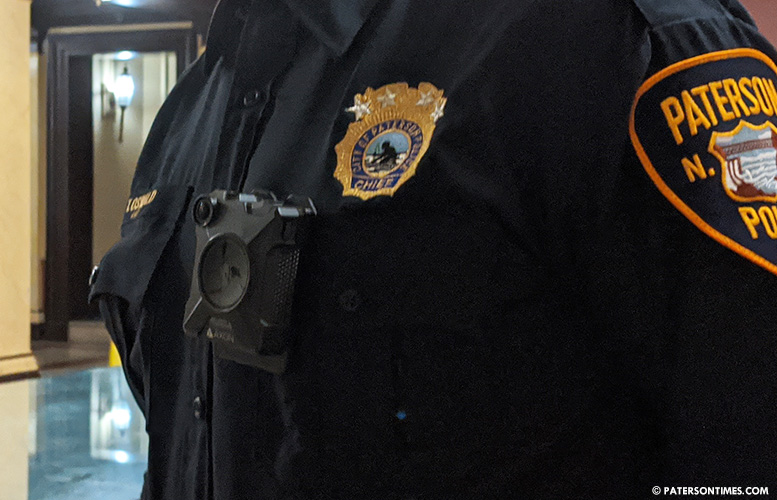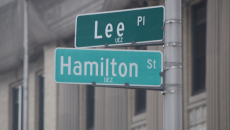Mayor Andre Sayegh has been slow to equip Paterson police officers with bodycams that the City Council purchased more than a year ago.
Paterson’s failure to put the 150 cameras to use in the first year of the five-year contract approved in January 2020 has resulted in a $44,000 loss for taxpayers, according to an analysis of invoices and contract by the Paterson Times.
How did taxpayers lose money?
Paterson purchased annual subscriptions, hardware, and services from Scottsdale, Ariz.-based Axon Enterprise for the police bodycam initiative. For the first year of the contract, there are several subscriptions, including the company’s assurance package for $36,000 and cloud video storage subscription for $7,892. There were hardware – camera assembly and docks – expenses of $99,278 and $4,500 for “service day” and “Axon starter.” First year expenses for the 150 cameras totaled $147,669, according to municipal records.
By failing to deploy the bodycams in the first year, Paterson lost $44,000 in annual assurance package cost and cloud storage expenses. It’s the equivalent of purchasing a Netflix subscription, paying every month, and not watching a single show or film.
Former police chief Troy Oswald had said he would have the bodycams in use by March 2020. He was ousted by Sayegh. Sayegh then appointed his own chief. The bodycam initiative fell by the wayside.
What caused the delays?
“With the contract being signed in February 2020, we took immediate steps to obtain the materials, and begin the construction needed to implement the program,” said lieutenant Todd Pearl responding on behalf of public safety director Jerry Speziale. “In part, the pandemic had a significant impact on our ability to roll out the program in a more timely manner.”
Pearl said the shipment of cameras that was expected to arrive in February 2020 was delayed by “couple months” because it was coming from another country. He also said there were “unforeseen construction and technical issues” related to installation that emerged after the bodycams were received by police.
An Axon representative, tasked to provide technical training on the use of the bodycams, could not fly in because of Covid-19 restrictions until September 2020. Police also had to devise a “clear and comprehensive policy” for bodycams, said Pearl.
“What does Covid-19 have to do with crafting a policy?” remarked Zellie Thomas, a leader in the Black Lives Matter movement. “There were all these excuses about the body cameras. I think now we’re realizing a lot of those excuses were straight up lies.”
Sayegh rolled out just 25 bodycams out of 150 in January 2021. He at the time said if the trial is successful more body cameras would be deployed in March.
On January 19, 2019, under pressure after the death of Jameek Lowery, Sayegh promised the public to equip officers with bodycams. His promise remains largely unfulfilled as 125 bodycams remain in storage.
“There’s a lot of waste when it comes to Paterson. There’s a lot of wasteful spending when it comes to the Paterson Police Department. And the public just isn’t aware of these things,” said Thomas.
Trust in police hasn’t improved since Sayegh’s body camera promise. Last month, lawyers and civil rights organizations claimed three people were assaulted by Paterson police officers.
“The officers themselves have to get body cameras. I was astounded to find out that Paterson still hasn’t fully implemented it, despite the fact that they have them,” said Diego Navas, an attorney representing one of the three people, in a news conference last month.
“I can’t make any comments on it until I find out about it myself,” said councilwoman Ruby Cotton, chairwoman of the public safety committee that oversees police and fire. A reporter sent her the bodycam documents that were reviewed by the Paterson Times.
Council president Flavio Rivera said the City Council did its part. He pointed out he included funding for the bodycams in the city’s capital budget. Before his action, Sayegh was selling a hollow promise and hadn’t identified funding to make it reality.
“When I first heard that the reason why we couldn’t get body cameras was because of money, I said this is unacceptable. Let’s bond for it. I made the resources available. Someone has to execute,” said Rivera.
Rivera said the administration has to deploy all 150 cameras.
“Why do we have a mindset, if it’s successful? It has to be successful. It has to. Other places are doing it,” said the council president.
Council members approved the $581,829 five-year contract for the bodycams last January. It translates to $147,669 for the first year and $108,540 every year thereafter, according to government records.
Majority of the City Council members have said they have no confidence in Sayegh or his administration. They have cited a long list of Sayegh’s failures during his tenure as mayor.
Year two expenses are mostly subscription for cloud storage and bodycams.
If Sayegh fails to deploy the other 125 cameras, Paterson will lose $90,000 in the second year of the Axon contract. Every day that goes by without the city deploying all 150 bodycams, Paterson homeowners are losing money.
Email: [email protected]



